Report on Principles of Health and Social Care Practices in Care UK
VerifiedAdded on 2020/01/07
|16
|5581
|496
Report
AI Summary
This report provides a comprehensive overview of the principles of health and social care practices within the Care UK framework. It begins by outlining the core principles of support, emphasizing respect, privacy, independence, and equal opportunities. The report then details procedures for protecting clients, patients, and colleagues from harm, highlighting the importance of safety standards and emotional support. A significant portion is dedicated to the benefits of adopting a person-centered approach, illustrating how it enhances the well-being of service users through privacy, dignity, and the fulfillment of individual needs and preferences. The report also addresses ethical dilemmas and conflicts faced by care workers, such as managing medication refusals and handling challenging patient behaviors. Furthermore, it examines the implementation of relevant policies, legislation, and regulations, along with the impact of these on home care practices. The report also explores theories underpinning health and social care, social processes affecting service demand, and the evaluation of non-professional working. Finally, it defines the roles, responsibilities, and duties of care workers and concludes with recommendations for improving practice.
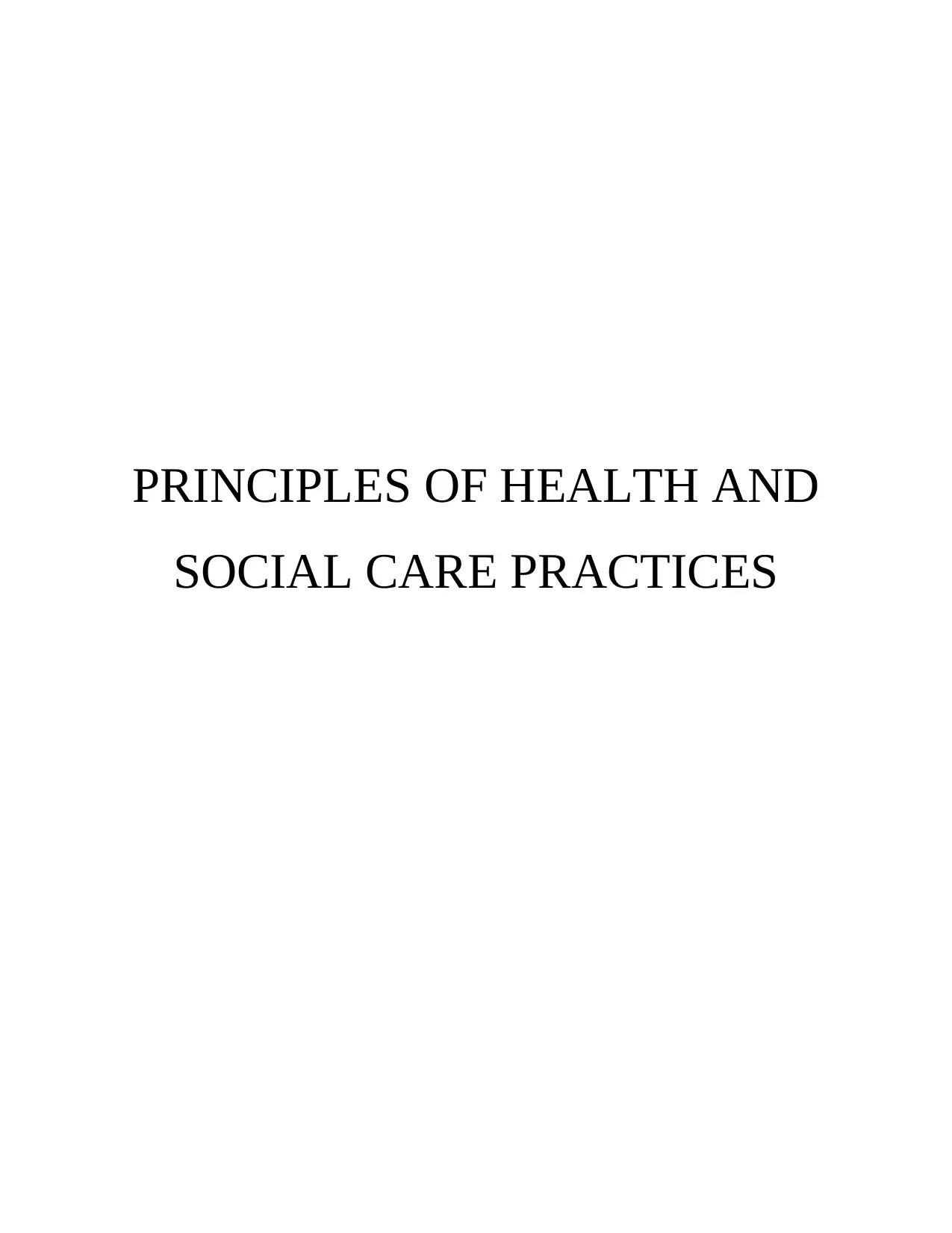
PRINCIPLES OF HEALTH AND
SOCIAL CARE PRACTICES
SOCIAL CARE PRACTICES
Paraphrase This Document
Need a fresh take? Get an instant paraphrase of this document with our AI Paraphraser
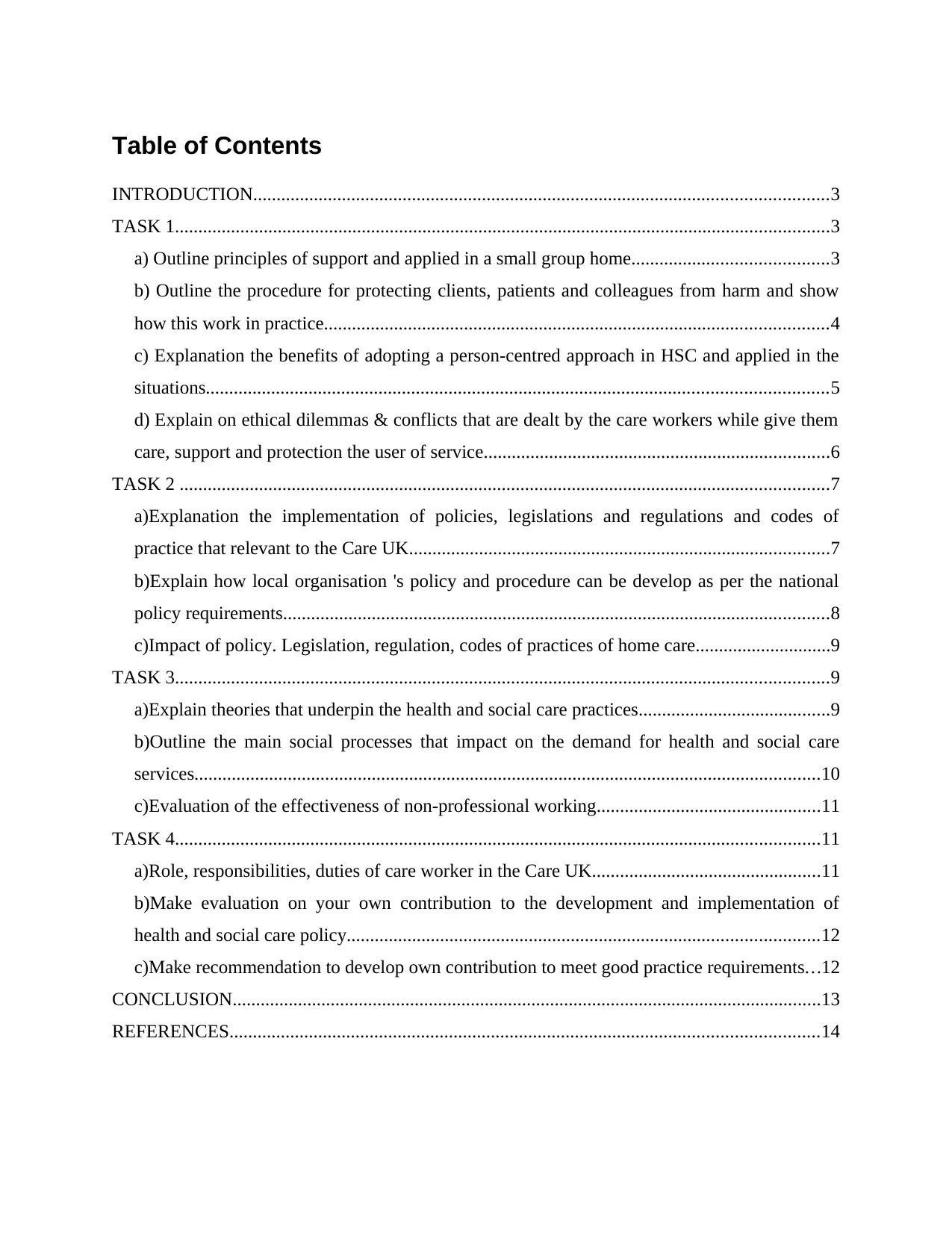
Table of Contents
INTRODUCTION...........................................................................................................................3
TASK 1............................................................................................................................................3
a) Outline principles of support and applied in a small group home..........................................3
b) Outline the procedure for protecting clients, patients and colleagues from harm and show
how this work in practice............................................................................................................4
c) Explanation the benefits of adopting a person-centred approach in HSC and applied in the
situations.....................................................................................................................................5
d) Explain on ethical dilemmas & conflicts that are dealt by the care workers while give them
care, support and protection the user of service..........................................................................6
TASK 2 ...........................................................................................................................................7
a)Explanation the implementation of policies, legislations and regulations and codes of
practice that relevant to the Care UK..........................................................................................7
b)Explain how local organisation 's policy and procedure can be develop as per the national
policy requirements.....................................................................................................................8
c)Impact of policy. Legislation, regulation, codes of practices of home care.............................9
TASK 3............................................................................................................................................9
a)Explain theories that underpin the health and social care practices.........................................9
b)Outline the main social processes that impact on the demand for health and social care
services......................................................................................................................................10
c)Evaluation of the effectiveness of non-professional working................................................11
TASK 4..........................................................................................................................................11
a)Role, responsibilities, duties of care worker in the Care UK.................................................11
b)Make evaluation on your own contribution to the development and implementation of
health and social care policy.....................................................................................................12
c)Make recommendation to develop own contribution to meet good practice requirements...12
CONCLUSION..............................................................................................................................13
REFERENCES..............................................................................................................................14
INTRODUCTION...........................................................................................................................3
TASK 1............................................................................................................................................3
a) Outline principles of support and applied in a small group home..........................................3
b) Outline the procedure for protecting clients, patients and colleagues from harm and show
how this work in practice............................................................................................................4
c) Explanation the benefits of adopting a person-centred approach in HSC and applied in the
situations.....................................................................................................................................5
d) Explain on ethical dilemmas & conflicts that are dealt by the care workers while give them
care, support and protection the user of service..........................................................................6
TASK 2 ...........................................................................................................................................7
a)Explanation the implementation of policies, legislations and regulations and codes of
practice that relevant to the Care UK..........................................................................................7
b)Explain how local organisation 's policy and procedure can be develop as per the national
policy requirements.....................................................................................................................8
c)Impact of policy. Legislation, regulation, codes of practices of home care.............................9
TASK 3............................................................................................................................................9
a)Explain theories that underpin the health and social care practices.........................................9
b)Outline the main social processes that impact on the demand for health and social care
services......................................................................................................................................10
c)Evaluation of the effectiveness of non-professional working................................................11
TASK 4..........................................................................................................................................11
a)Role, responsibilities, duties of care worker in the Care UK.................................................11
b)Make evaluation on your own contribution to the development and implementation of
health and social care policy.....................................................................................................12
c)Make recommendation to develop own contribution to meet good practice requirements...12
CONCLUSION..............................................................................................................................13
REFERENCES..............................................................................................................................14
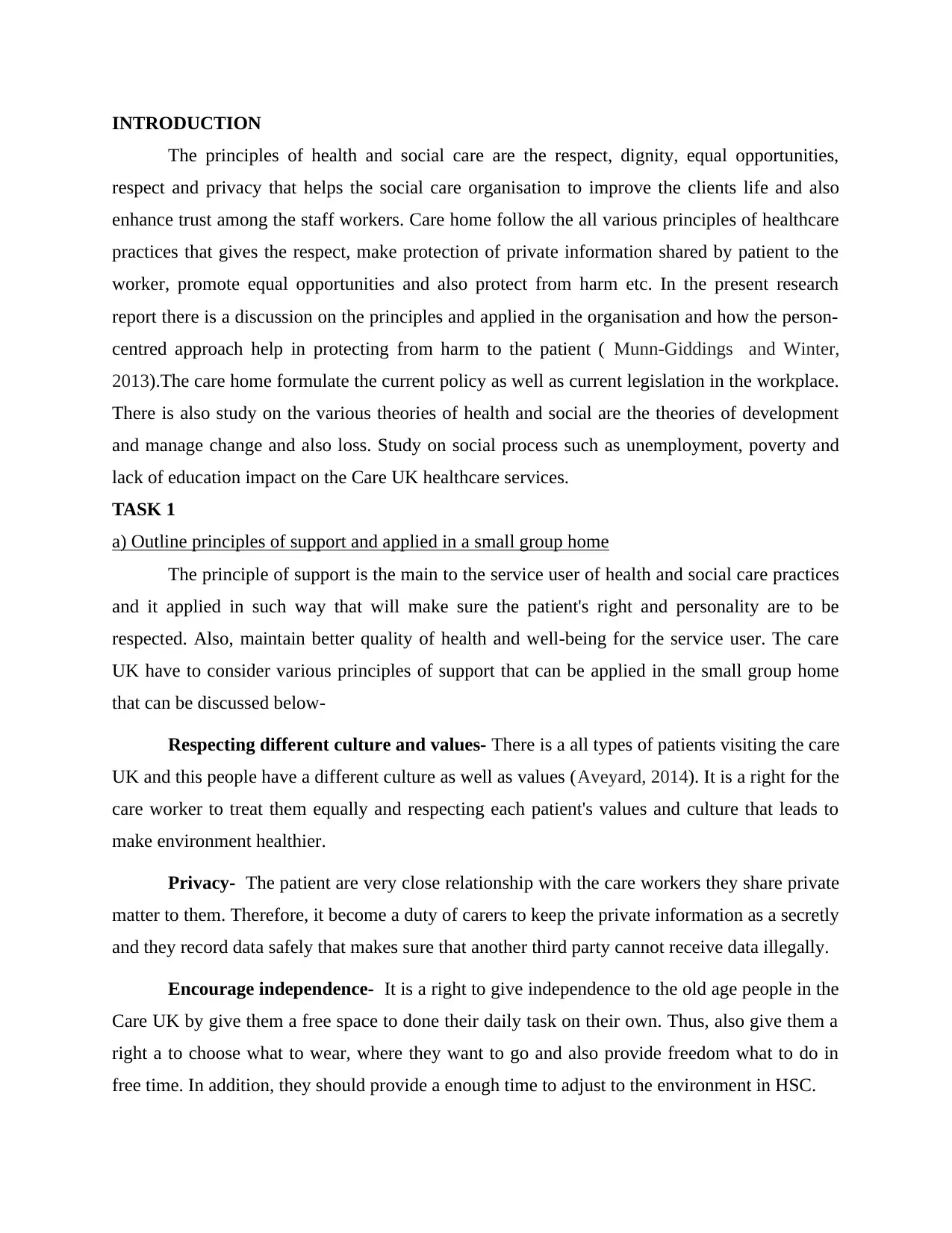
INTRODUCTION
The principles of health and social care are the respect, dignity, equal opportunities,
respect and privacy that helps the social care organisation to improve the clients life and also
enhance trust among the staff workers. Care home follow the all various principles of healthcare
practices that gives the respect, make protection of private information shared by patient to the
worker, promote equal opportunities and also protect from harm etc. In the present research
report there is a discussion on the principles and applied in the organisation and how the person-
centred approach help in protecting from harm to the patient ( Munn-Giddings and Winter,
2013).The care home formulate the current policy as well as current legislation in the workplace.
There is also study on the various theories of health and social are the theories of development
and manage change and also loss. Study on social process such as unemployment, poverty and
lack of education impact on the Care UK healthcare services.
TASK 1
a) Outline principles of support and applied in a small group home
The principle of support is the main to the service user of health and social care practices
and it applied in such way that will make sure the patient's right and personality are to be
respected. Also, maintain better quality of health and well-being for the service user. The care
UK have to consider various principles of support that can be applied in the small group home
that can be discussed below-
Respecting different culture and values- There is a all types of patients visiting the care
UK and this people have a different culture as well as values (Aveyard, 2014). It is a right for the
care worker to treat them equally and respecting each patient's values and culture that leads to
make environment healthier.
Privacy- The patient are very close relationship with the care workers they share private
matter to them. Therefore, it become a duty of carers to keep the private information as a secretly
and they record data safely that makes sure that another third party cannot receive data illegally.
Encourage independence- It is a right to give independence to the old age people in the
Care UK by give them a free space to done their daily task on their own. Thus, also give them a
right a to choose what to wear, where they want to go and also provide freedom what to do in
free time. In addition, they should provide a enough time to adjust to the environment in HSC.
The principles of health and social care are the respect, dignity, equal opportunities,
respect and privacy that helps the social care organisation to improve the clients life and also
enhance trust among the staff workers. Care home follow the all various principles of healthcare
practices that gives the respect, make protection of private information shared by patient to the
worker, promote equal opportunities and also protect from harm etc. In the present research
report there is a discussion on the principles and applied in the organisation and how the person-
centred approach help in protecting from harm to the patient ( Munn-Giddings and Winter,
2013).The care home formulate the current policy as well as current legislation in the workplace.
There is also study on the various theories of health and social are the theories of development
and manage change and also loss. Study on social process such as unemployment, poverty and
lack of education impact on the Care UK healthcare services.
TASK 1
a) Outline principles of support and applied in a small group home
The principle of support is the main to the service user of health and social care practices
and it applied in such way that will make sure the patient's right and personality are to be
respected. Also, maintain better quality of health and well-being for the service user. The care
UK have to consider various principles of support that can be applied in the small group home
that can be discussed below-
Respecting different culture and values- There is a all types of patients visiting the care
UK and this people have a different culture as well as values (Aveyard, 2014). It is a right for the
care worker to treat them equally and respecting each patient's values and culture that leads to
make environment healthier.
Privacy- The patient are very close relationship with the care workers they share private
matter to them. Therefore, it become a duty of carers to keep the private information as a secretly
and they record data safely that makes sure that another third party cannot receive data illegally.
Encourage independence- It is a right to give independence to the old age people in the
Care UK by give them a free space to done their daily task on their own. Thus, also give them a
right a to choose what to wear, where they want to go and also provide freedom what to do in
free time. In addition, they should provide a enough time to adjust to the environment in HSC.
⊘ This is a preview!⊘
Do you want full access?
Subscribe today to unlock all pages.

Trusted by 1+ million students worldwide
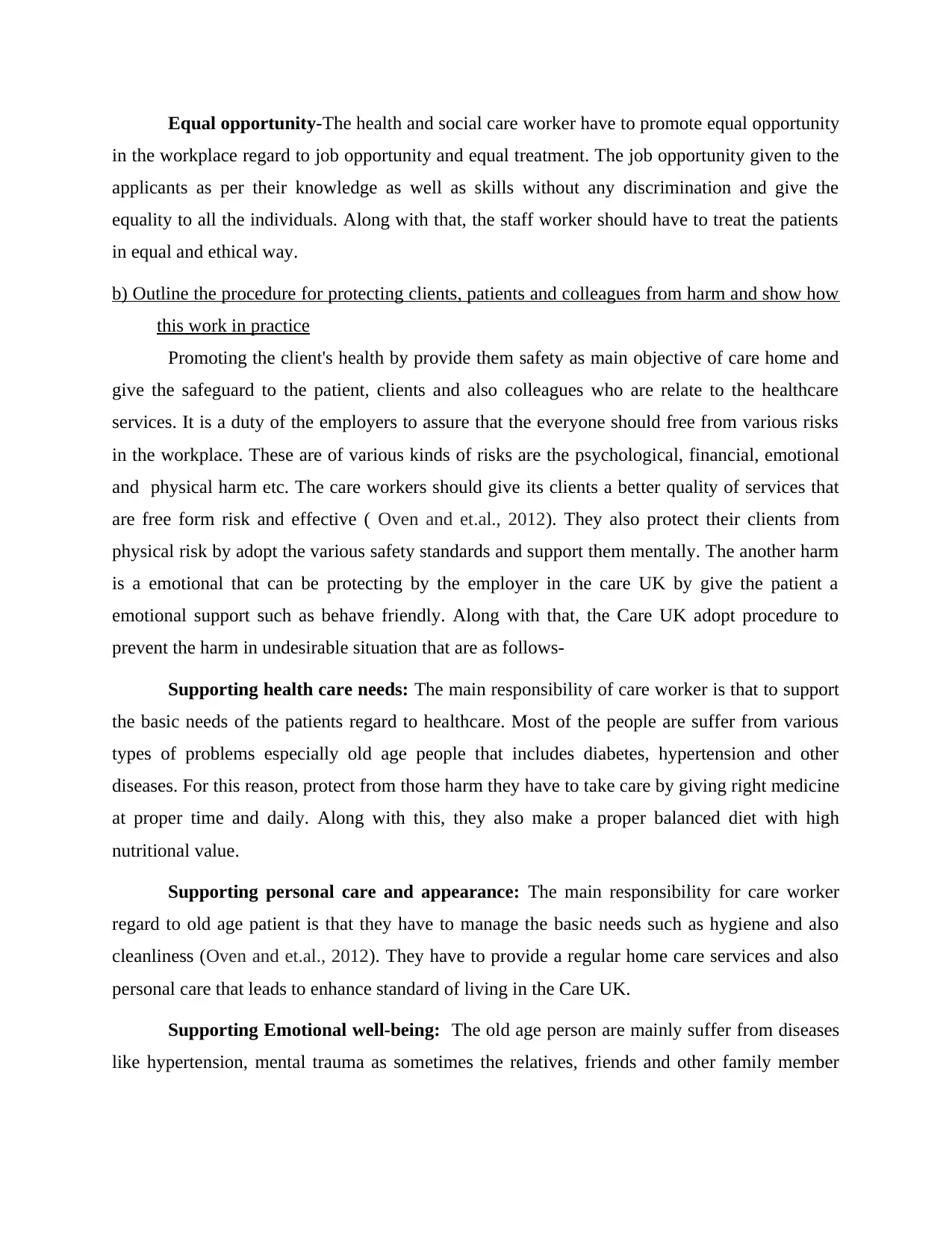
Equal opportunity-The health and social care worker have to promote equal opportunity
in the workplace regard to job opportunity and equal treatment. The job opportunity given to the
applicants as per their knowledge as well as skills without any discrimination and give the
equality to all the individuals. Along with that, the staff worker should have to treat the patients
in equal and ethical way.
b) Outline the procedure for protecting clients, patients and colleagues from harm and show how
this work in practice
Promoting the client's health by provide them safety as main objective of care home and
give the safeguard to the patient, clients and also colleagues who are relate to the healthcare
services. It is a duty of the employers to assure that the everyone should free from various risks
in the workplace. These are of various kinds of risks are the psychological, financial, emotional
and physical harm etc. The care workers should give its clients a better quality of services that
are free form risk and effective ( Oven and et.al., 2012). They also protect their clients from
physical risk by adopt the various safety standards and support them mentally. The another harm
is a emotional that can be protecting by the employer in the care UK by give the patient a
emotional support such as behave friendly. Along with that, the Care UK adopt procedure to
prevent the harm in undesirable situation that are as follows-
Supporting health care needs: The main responsibility of care worker is that to support
the basic needs of the patients regard to healthcare. Most of the people are suffer from various
types of problems especially old age people that includes diabetes, hypertension and other
diseases. For this reason, protect from those harm they have to take care by giving right medicine
at proper time and daily. Along with this, they also make a proper balanced diet with high
nutritional value.
Supporting personal care and appearance: The main responsibility for care worker
regard to old age patient is that they have to manage the basic needs such as hygiene and also
cleanliness (Oven and et.al., 2012). They have to provide a regular home care services and also
personal care that leads to enhance standard of living in the Care UK.
Supporting Emotional well-being: The old age person are mainly suffer from diseases
like hypertension, mental trauma as sometimes the relatives, friends and other family member
in the workplace regard to job opportunity and equal treatment. The job opportunity given to the
applicants as per their knowledge as well as skills without any discrimination and give the
equality to all the individuals. Along with that, the staff worker should have to treat the patients
in equal and ethical way.
b) Outline the procedure for protecting clients, patients and colleagues from harm and show how
this work in practice
Promoting the client's health by provide them safety as main objective of care home and
give the safeguard to the patient, clients and also colleagues who are relate to the healthcare
services. It is a duty of the employers to assure that the everyone should free from various risks
in the workplace. These are of various kinds of risks are the psychological, financial, emotional
and physical harm etc. The care workers should give its clients a better quality of services that
are free form risk and effective ( Oven and et.al., 2012). They also protect their clients from
physical risk by adopt the various safety standards and support them mentally. The another harm
is a emotional that can be protecting by the employer in the care UK by give the patient a
emotional support such as behave friendly. Along with that, the Care UK adopt procedure to
prevent the harm in undesirable situation that are as follows-
Supporting health care needs: The main responsibility of care worker is that to support
the basic needs of the patients regard to healthcare. Most of the people are suffer from various
types of problems especially old age people that includes diabetes, hypertension and other
diseases. For this reason, protect from those harm they have to take care by giving right medicine
at proper time and daily. Along with this, they also make a proper balanced diet with high
nutritional value.
Supporting personal care and appearance: The main responsibility for care worker
regard to old age patient is that they have to manage the basic needs such as hygiene and also
cleanliness (Oven and et.al., 2012). They have to provide a regular home care services and also
personal care that leads to enhance standard of living in the Care UK.
Supporting Emotional well-being: The old age person are mainly suffer from diseases
like hypertension, mental trauma as sometimes the relatives, friends and other family member
Paraphrase This Document
Need a fresh take? Get an instant paraphrase of this document with our AI Paraphraser
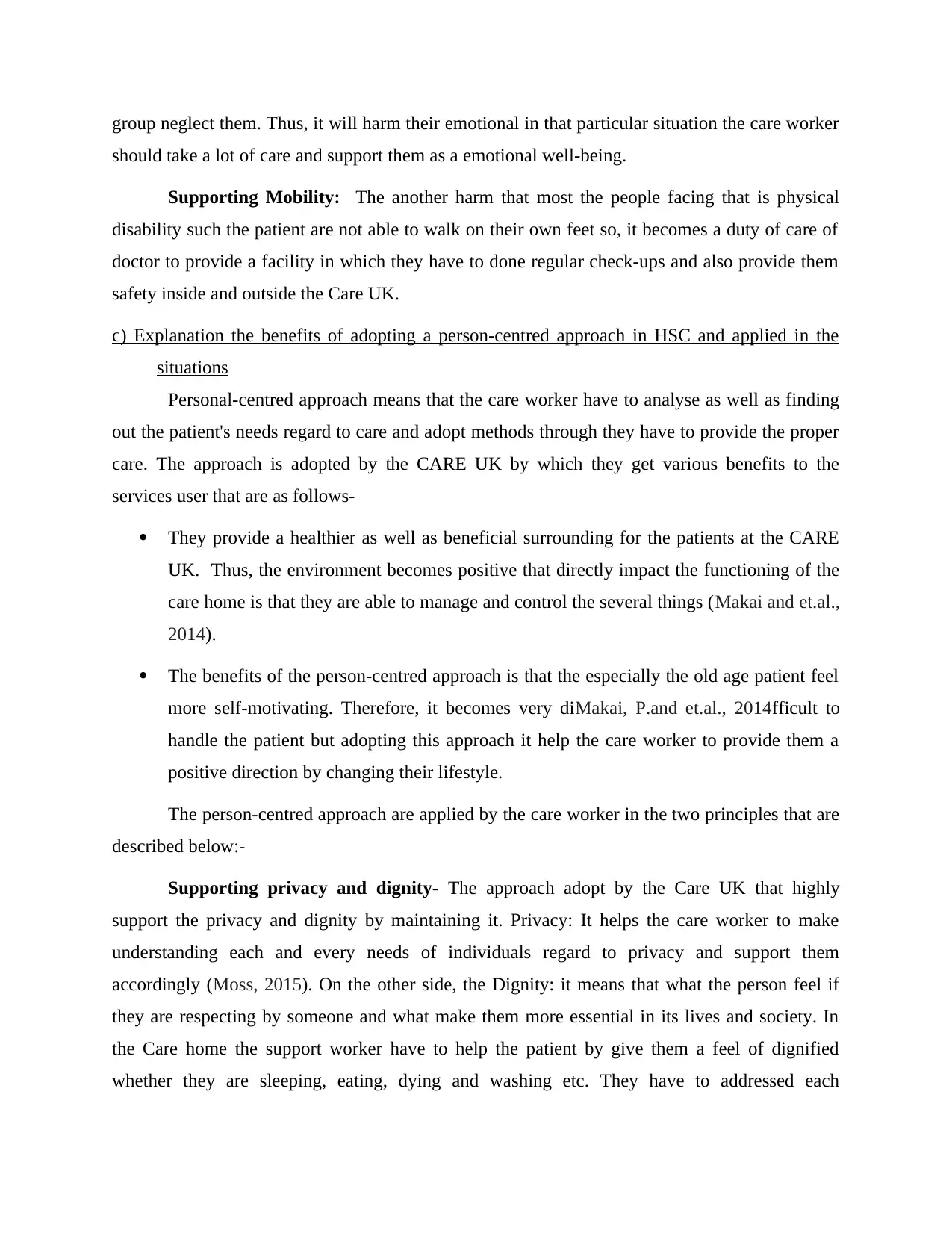
group neglect them. Thus, it will harm their emotional in that particular situation the care worker
should take a lot of care and support them as a emotional well-being.
Supporting Mobility: The another harm that most the people facing that is physical
disability such the patient are not able to walk on their own feet so, it becomes a duty of care of
doctor to provide a facility in which they have to done regular check-ups and also provide them
safety inside and outside the Care UK.
c) Explanation the benefits of adopting a person-centred approach in HSC and applied in the
situations
Personal-centred approach means that the care worker have to analyse as well as finding
out the patient's needs regard to care and adopt methods through they have to provide the proper
care. The approach is adopted by the CARE UK by which they get various benefits to the
services user that are as follows-
They provide a healthier as well as beneficial surrounding for the patients at the CARE
UK. Thus, the environment becomes positive that directly impact the functioning of the
care home is that they are able to manage and control the several things (Makai and et.al.,
2014).
The benefits of the person-centred approach is that the especially the old age patient feel
more self-motivating. Therefore, it becomes very diMakai, P.and et.al., 2014fficult to
handle the patient but adopting this approach it help the care worker to provide them a
positive direction by changing their lifestyle.
The person-centred approach are applied by the care worker in the two principles that are
described below:-
Supporting privacy and dignity- The approach adopt by the Care UK that highly
support the privacy and dignity by maintaining it. Privacy: It helps the care worker to make
understanding each and every needs of individuals regard to privacy and support them
accordingly (Moss, 2015). On the other side, the Dignity: it means that what the person feel if
they are respecting by someone and what make them more essential in its lives and society. In
the Care home the support worker have to help the patient by give them a feel of dignified
whether they are sleeping, eating, dying and washing etc. They have to addressed each
should take a lot of care and support them as a emotional well-being.
Supporting Mobility: The another harm that most the people facing that is physical
disability such the patient are not able to walk on their own feet so, it becomes a duty of care of
doctor to provide a facility in which they have to done regular check-ups and also provide them
safety inside and outside the Care UK.
c) Explanation the benefits of adopting a person-centred approach in HSC and applied in the
situations
Personal-centred approach means that the care worker have to analyse as well as finding
out the patient's needs regard to care and adopt methods through they have to provide the proper
care. The approach is adopted by the CARE UK by which they get various benefits to the
services user that are as follows-
They provide a healthier as well as beneficial surrounding for the patients at the CARE
UK. Thus, the environment becomes positive that directly impact the functioning of the
care home is that they are able to manage and control the several things (Makai and et.al.,
2014).
The benefits of the person-centred approach is that the especially the old age patient feel
more self-motivating. Therefore, it becomes very diMakai, P.and et.al., 2014fficult to
handle the patient but adopting this approach it help the care worker to provide them a
positive direction by changing their lifestyle.
The person-centred approach are applied by the care worker in the two principles that are
described below:-
Supporting privacy and dignity- The approach adopt by the Care UK that highly
support the privacy and dignity by maintaining it. Privacy: It helps the care worker to make
understanding each and every needs of individuals regard to privacy and support them
accordingly (Moss, 2015). On the other side, the Dignity: it means that what the person feel if
they are respecting by someone and what make them more essential in its lives and society. In
the Care home the support worker have to help the patient by give them a feel of dignified
whether they are sleeping, eating, dying and washing etc. They have to addressed each
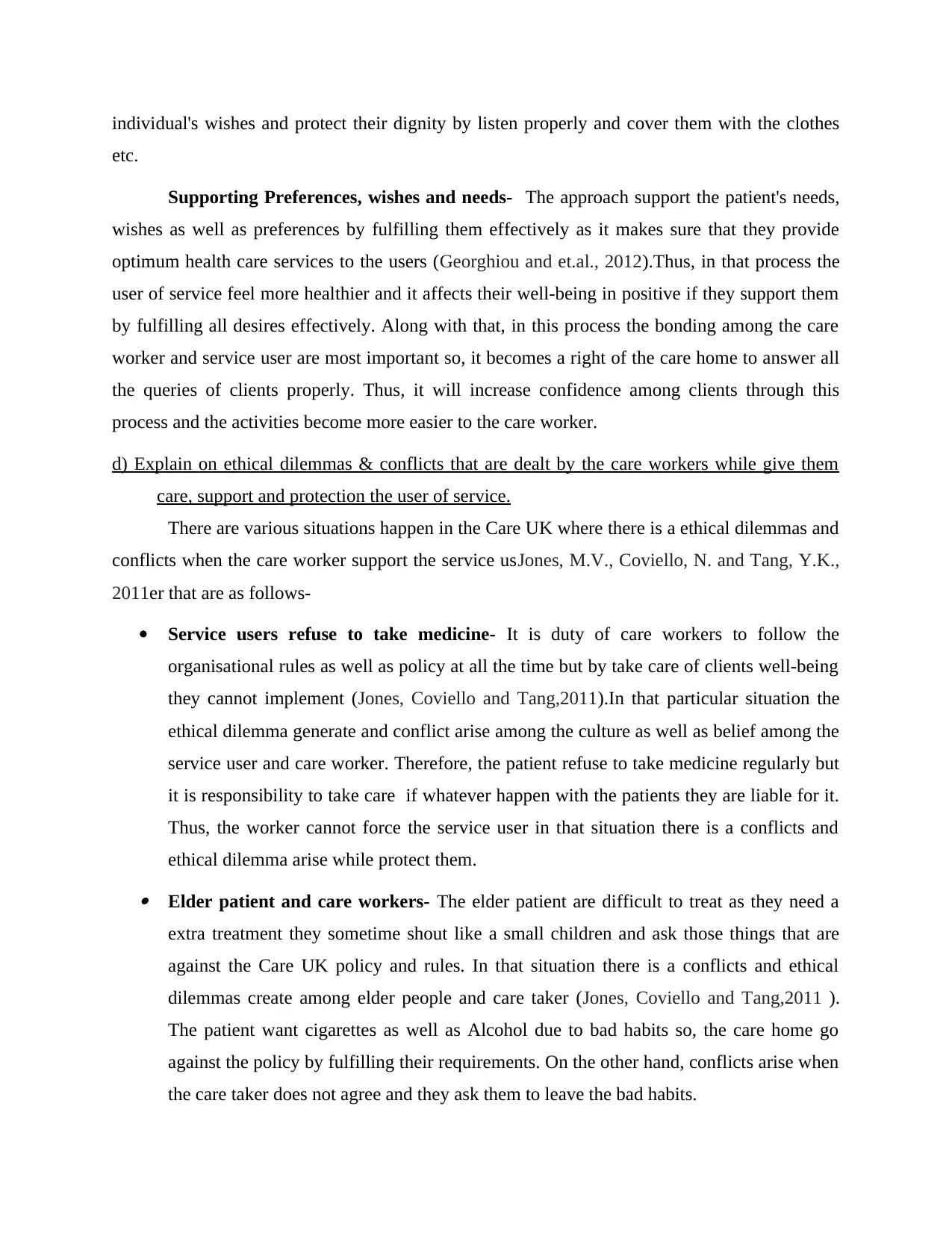
individual's wishes and protect their dignity by listen properly and cover them with the clothes
etc.
Supporting Preferences, wishes and needs- The approach support the patient's needs,
wishes as well as preferences by fulfilling them effectively as it makes sure that they provide
optimum health care services to the users (Georghiou and et.al., 2012).Thus, in that process the
user of service feel more healthier and it affects their well-being in positive if they support them
by fulfilling all desires effectively. Along with that, in this process the bonding among the care
worker and service user are most important so, it becomes a right of the care home to answer all
the queries of clients properly. Thus, it will increase confidence among clients through this
process and the activities become more easier to the care worker.
d) Explain on ethical dilemmas & conflicts that are dealt by the care workers while give them
care, support and protection the user of service.
There are various situations happen in the Care UK where there is a ethical dilemmas and
conflicts when the care worker support the service usJones, M.V., Coviello, N. and Tang, Y.K.,
2011er that are as follows-
Service users refuse to take medicine- It is duty of care workers to follow the
organisational rules as well as policy at all the time but by take care of clients well-being
they cannot implement (Jones, Coviello and Tang,2011).In that particular situation the
ethical dilemma generate and conflict arise among the culture as well as belief among the
service user and care worker. Therefore, the patient refuse to take medicine regularly but
it is responsibility to take care if whatever happen with the patients they are liable for it.
Thus, the worker cannot force the service user in that situation there is a conflicts and
ethical dilemma arise while protect them. Elder patient and care workers- The elder patient are difficult to treat as they need a
extra treatment they sometime shout like a small children and ask those things that are
against the Care UK policy and rules. In that situation there is a conflicts and ethical
dilemmas create among elder people and care taker (Jones, Coviello and Tang,2011 ).
The patient want cigarettes as well as Alcohol due to bad habits so, the care home go
against the policy by fulfilling their requirements. On the other hand, conflicts arise when
the care taker does not agree and they ask them to leave the bad habits.
etc.
Supporting Preferences, wishes and needs- The approach support the patient's needs,
wishes as well as preferences by fulfilling them effectively as it makes sure that they provide
optimum health care services to the users (Georghiou and et.al., 2012).Thus, in that process the
user of service feel more healthier and it affects their well-being in positive if they support them
by fulfilling all desires effectively. Along with that, in this process the bonding among the care
worker and service user are most important so, it becomes a right of the care home to answer all
the queries of clients properly. Thus, it will increase confidence among clients through this
process and the activities become more easier to the care worker.
d) Explain on ethical dilemmas & conflicts that are dealt by the care workers while give them
care, support and protection the user of service.
There are various situations happen in the Care UK where there is a ethical dilemmas and
conflicts when the care worker support the service usJones, M.V., Coviello, N. and Tang, Y.K.,
2011er that are as follows-
Service users refuse to take medicine- It is duty of care workers to follow the
organisational rules as well as policy at all the time but by take care of clients well-being
they cannot implement (Jones, Coviello and Tang,2011).In that particular situation the
ethical dilemma generate and conflict arise among the culture as well as belief among the
service user and care worker. Therefore, the patient refuse to take medicine regularly but
it is responsibility to take care if whatever happen with the patients they are liable for it.
Thus, the worker cannot force the service user in that situation there is a conflicts and
ethical dilemma arise while protect them. Elder patient and care workers- The elder patient are difficult to treat as they need a
extra treatment they sometime shout like a small children and ask those things that are
against the Care UK policy and rules. In that situation there is a conflicts and ethical
dilemmas create among elder people and care taker (Jones, Coviello and Tang,2011 ).
The patient want cigarettes as well as Alcohol due to bad habits so, the care home go
against the policy by fulfilling their requirements. On the other hand, conflicts arise when
the care taker does not agree and they ask them to leave the bad habits.
⊘ This is a preview!⊘
Do you want full access?
Subscribe today to unlock all pages.

Trusted by 1+ million students worldwide
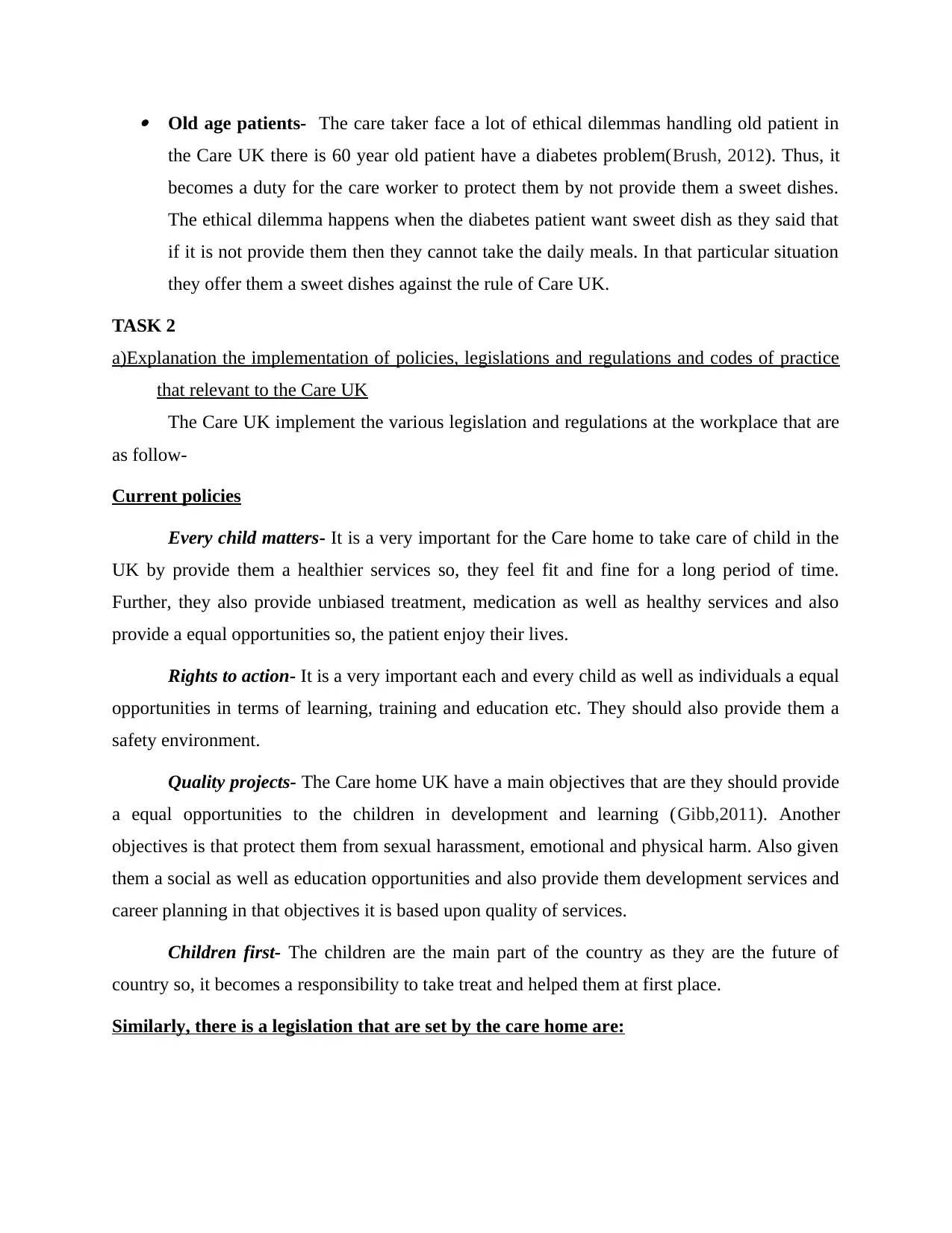
Old age patients- The care taker face a lot of ethical dilemmas handling old patient in
the Care UK there is 60 year old patient have a diabetes problem(Brush, 2012). Thus, it
becomes a duty for the care worker to protect them by not provide them a sweet dishes.
The ethical dilemma happens when the diabetes patient want sweet dish as they said that
if it is not provide them then they cannot take the daily meals. In that particular situation
they offer them a sweet dishes against the rule of Care UK.
TASK 2
a)Explanation the implementation of policies, legislations and regulations and codes of practice
that relevant to the Care UK
The Care UK implement the various legislation and regulations at the workplace that are
as follow-
Current policies
Every child matters- It is a very important for the Care home to take care of child in the
UK by provide them a healthier services so, they feel fit and fine for a long period of time.
Further, they also provide unbiased treatment, medication as well as healthy services and also
provide a equal opportunities so, the patient enjoy their lives.
Rights to action- It is a very important each and every child as well as individuals a equal
opportunities in terms of learning, training and education etc. They should also provide them a
safety environment.
Quality projects- The Care home UK have a main objectives that are they should provide
a equal opportunities to the children in development and learning (Gibb,2011). Another
objectives is that protect them from sexual harassment, emotional and physical harm. Also given
them a social as well as education opportunities and also provide them development services and
career planning in that objectives it is based upon quality of services.
Children first- The children are the main part of the country as they are the future of
country so, it becomes a responsibility to take treat and helped them at first place.
Similarly, there is a legislation that are set by the care home are:
the Care UK there is 60 year old patient have a diabetes problem(Brush, 2012). Thus, it
becomes a duty for the care worker to protect them by not provide them a sweet dishes.
The ethical dilemma happens when the diabetes patient want sweet dish as they said that
if it is not provide them then they cannot take the daily meals. In that particular situation
they offer them a sweet dishes against the rule of Care UK.
TASK 2
a)Explanation the implementation of policies, legislations and regulations and codes of practice
that relevant to the Care UK
The Care UK implement the various legislation and regulations at the workplace that are
as follow-
Current policies
Every child matters- It is a very important for the Care home to take care of child in the
UK by provide them a healthier services so, they feel fit and fine for a long period of time.
Further, they also provide unbiased treatment, medication as well as healthy services and also
provide a equal opportunities so, the patient enjoy their lives.
Rights to action- It is a very important each and every child as well as individuals a equal
opportunities in terms of learning, training and education etc. They should also provide them a
safety environment.
Quality projects- The Care home UK have a main objectives that are they should provide
a equal opportunities to the children in development and learning (Gibb,2011). Another
objectives is that protect them from sexual harassment, emotional and physical harm. Also given
them a social as well as education opportunities and also provide them development services and
career planning in that objectives it is based upon quality of services.
Children first- The children are the main part of the country as they are the future of
country so, it becomes a responsibility to take treat and helped them at first place.
Similarly, there is a legislation that are set by the care home are:
Paraphrase This Document
Need a fresh take? Get an instant paraphrase of this document with our AI Paraphraser
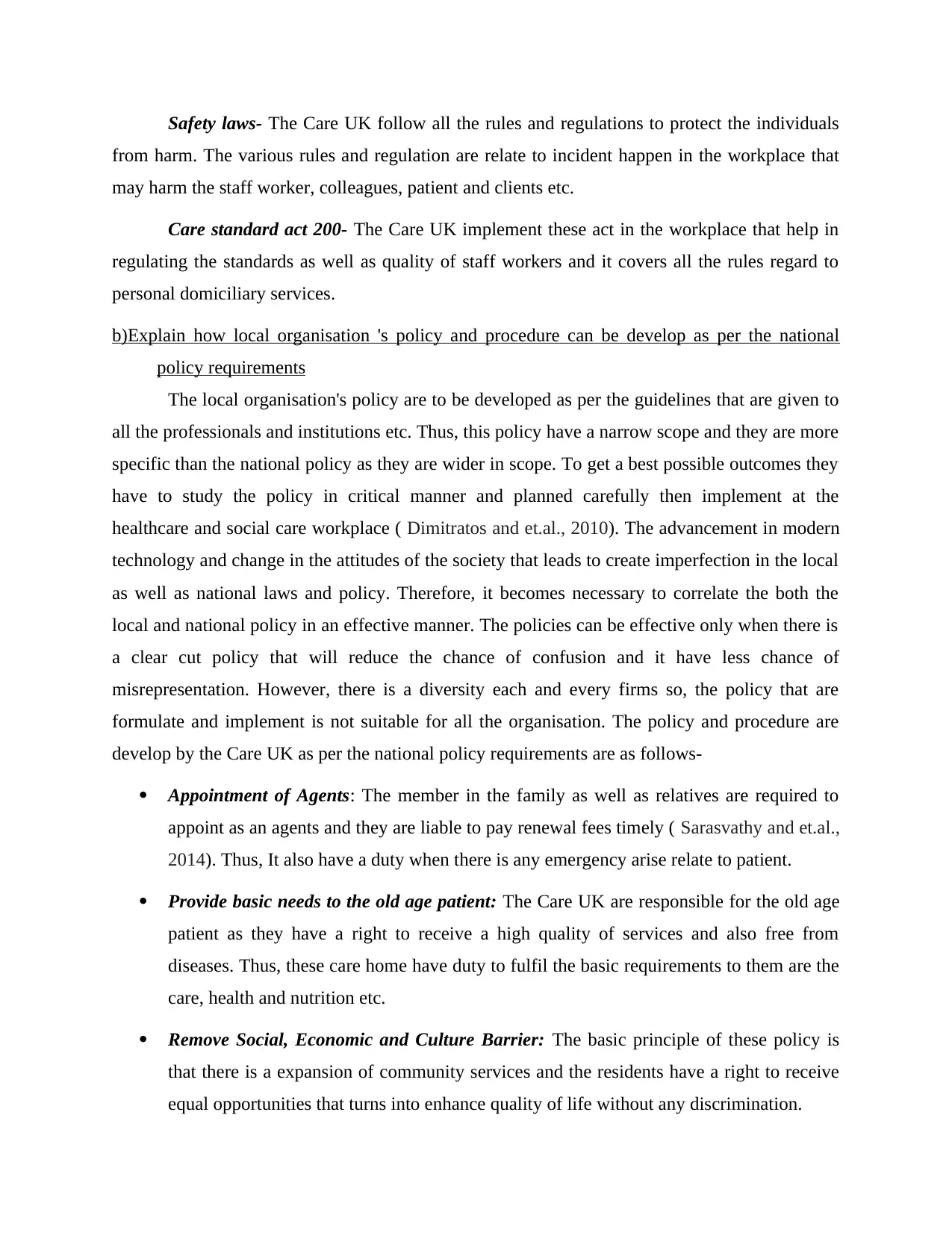
Safety laws- The Care UK follow all the rules and regulations to protect the individuals
from harm. The various rules and regulation are relate to incident happen in the workplace that
may harm the staff worker, colleagues, patient and clients etc.
Care standard act 200- The Care UK implement these act in the workplace that help in
regulating the standards as well as quality of staff workers and it covers all the rules regard to
personal domiciliary services.
b)Explain how local organisation 's policy and procedure can be develop as per the national
policy requirements
The local organisation's policy are to be developed as per the guidelines that are given to
all the professionals and institutions etc. Thus, this policy have a narrow scope and they are more
specific than the national policy as they are wider in scope. To get a best possible outcomes they
have to study the policy in critical manner and planned carefully then implement at the
healthcare and social care workplace ( Dimitratos and et.al., 2010). The advancement in modern
technology and change in the attitudes of the society that leads to create imperfection in the local
as well as national laws and policy. Therefore, it becomes necessary to correlate the both the
local and national policy in an effective manner. The policies can be effective only when there is
a clear cut policy that will reduce the chance of confusion and it have less chance of
misrepresentation. However, there is a diversity each and every firms so, the policy that are
formulate and implement is not suitable for all the organisation. The policy and procedure are
develop by the Care UK as per the national policy requirements are as follows-
Appointment of Agents: The member in the family as well as relatives are required to
appoint as an agents and they are liable to pay renewal fees timely ( Sarasvathy and et.al.,
2014). Thus, It also have a duty when there is any emergency arise relate to patient.
Provide basic needs to the old age patient: The Care UK are responsible for the old age
patient as they have a right to receive a high quality of services and also free from
diseases. Thus, these care home have duty to fulfil the basic requirements to them are the
care, health and nutrition etc.
Remove Social, Economic and Culture Barrier: The basic principle of these policy is
that there is a expansion of community services and the residents have a right to receive
equal opportunities that turns into enhance quality of life without any discrimination.
from harm. The various rules and regulation are relate to incident happen in the workplace that
may harm the staff worker, colleagues, patient and clients etc.
Care standard act 200- The Care UK implement these act in the workplace that help in
regulating the standards as well as quality of staff workers and it covers all the rules regard to
personal domiciliary services.
b)Explain how local organisation 's policy and procedure can be develop as per the national
policy requirements
The local organisation's policy are to be developed as per the guidelines that are given to
all the professionals and institutions etc. Thus, this policy have a narrow scope and they are more
specific than the national policy as they are wider in scope. To get a best possible outcomes they
have to study the policy in critical manner and planned carefully then implement at the
healthcare and social care workplace ( Dimitratos and et.al., 2010). The advancement in modern
technology and change in the attitudes of the society that leads to create imperfection in the local
as well as national laws and policy. Therefore, it becomes necessary to correlate the both the
local and national policy in an effective manner. The policies can be effective only when there is
a clear cut policy that will reduce the chance of confusion and it have less chance of
misrepresentation. However, there is a diversity each and every firms so, the policy that are
formulate and implement is not suitable for all the organisation. The policy and procedure are
develop by the Care UK as per the national policy requirements are as follows-
Appointment of Agents: The member in the family as well as relatives are required to
appoint as an agents and they are liable to pay renewal fees timely ( Sarasvathy and et.al.,
2014). Thus, It also have a duty when there is any emergency arise relate to patient.
Provide basic needs to the old age patient: The Care UK are responsible for the old age
patient as they have a right to receive a high quality of services and also free from
diseases. Thus, these care home have duty to fulfil the basic requirements to them are the
care, health and nutrition etc.
Remove Social, Economic and Culture Barrier: The basic principle of these policy is
that there is a expansion of community services and the residents have a right to receive
equal opportunities that turns into enhance quality of life without any discrimination.
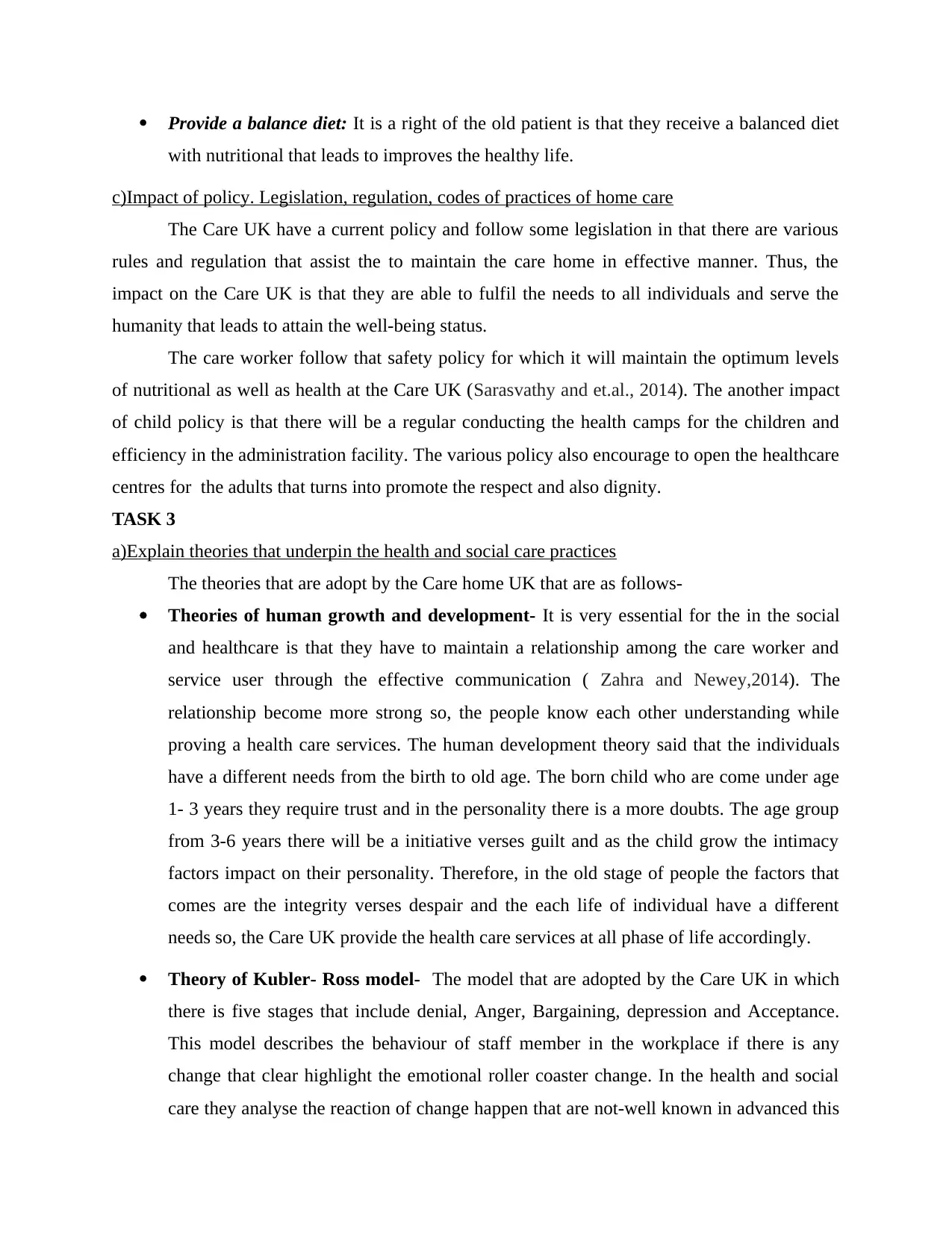
Provide a balance diet: It is a right of the old patient is that they receive a balanced diet
with nutritional that leads to improves the healthy life.
c)Impact of policy. Legislation, regulation, codes of practices of home care
The Care UK have a current policy and follow some legislation in that there are various
rules and regulation that assist the to maintain the care home in effective manner. Thus, the
impact on the Care UK is that they are able to fulfil the needs to all individuals and serve the
humanity that leads to attain the well-being status.
The care worker follow that safety policy for which it will maintain the optimum levels
of nutritional as well as health at the Care UK (Sarasvathy and et.al., 2014). The another impact
of child policy is that there will be a regular conducting the health camps for the children and
efficiency in the administration facility. The various policy also encourage to open the healthcare
centres for the adults that turns into promote the respect and also dignity.
TASK 3
a)Explain theories that underpin the health and social care practices
The theories that are adopt by the Care home UK that are as follows-
Theories of human growth and development- It is very essential for the in the social
and healthcare is that they have to maintain a relationship among the care worker and
service user through the effective communication ( Zahra and Newey,2014). The
relationship become more strong so, the people know each other understanding while
proving a health care services. The human development theory said that the individuals
have a different needs from the birth to old age. The born child who are come under age
1- 3 years they require trust and in the personality there is a more doubts. The age group
from 3-6 years there will be a initiative verses guilt and as the child grow the intimacy
factors impact on their personality. Therefore, in the old stage of people the factors that
comes are the integrity verses despair and the each life of individual have a different
needs so, the Care UK provide the health care services at all phase of life accordingly.
Theory of Kubler- Ross model- The model that are adopted by the Care UK in which
there is five stages that include denial, Anger, Bargaining, depression and Acceptance.
This model describes the behaviour of staff member in the workplace if there is any
change that clear highlight the emotional roller coaster change. In the health and social
care they analyse the reaction of change happen that are not-well known in advanced this
with nutritional that leads to improves the healthy life.
c)Impact of policy. Legislation, regulation, codes of practices of home care
The Care UK have a current policy and follow some legislation in that there are various
rules and regulation that assist the to maintain the care home in effective manner. Thus, the
impact on the Care UK is that they are able to fulfil the needs to all individuals and serve the
humanity that leads to attain the well-being status.
The care worker follow that safety policy for which it will maintain the optimum levels
of nutritional as well as health at the Care UK (Sarasvathy and et.al., 2014). The another impact
of child policy is that there will be a regular conducting the health camps for the children and
efficiency in the administration facility. The various policy also encourage to open the healthcare
centres for the adults that turns into promote the respect and also dignity.
TASK 3
a)Explain theories that underpin the health and social care practices
The theories that are adopt by the Care home UK that are as follows-
Theories of human growth and development- It is very essential for the in the social
and healthcare is that they have to maintain a relationship among the care worker and
service user through the effective communication ( Zahra and Newey,2014). The
relationship become more strong so, the people know each other understanding while
proving a health care services. The human development theory said that the individuals
have a different needs from the birth to old age. The born child who are come under age
1- 3 years they require trust and in the personality there is a more doubts. The age group
from 3-6 years there will be a initiative verses guilt and as the child grow the intimacy
factors impact on their personality. Therefore, in the old stage of people the factors that
comes are the integrity verses despair and the each life of individual have a different
needs so, the Care UK provide the health care services at all phase of life accordingly.
Theory of Kubler- Ross model- The model that are adopted by the Care UK in which
there is five stages that include denial, Anger, Bargaining, depression and Acceptance.
This model describes the behaviour of staff member in the workplace if there is any
change that clear highlight the emotional roller coaster change. In the health and social
care they analyse the reaction of change happen that are not-well known in advanced this
⊘ This is a preview!⊘
Do you want full access?
Subscribe today to unlock all pages.

Trusted by 1+ million students worldwide
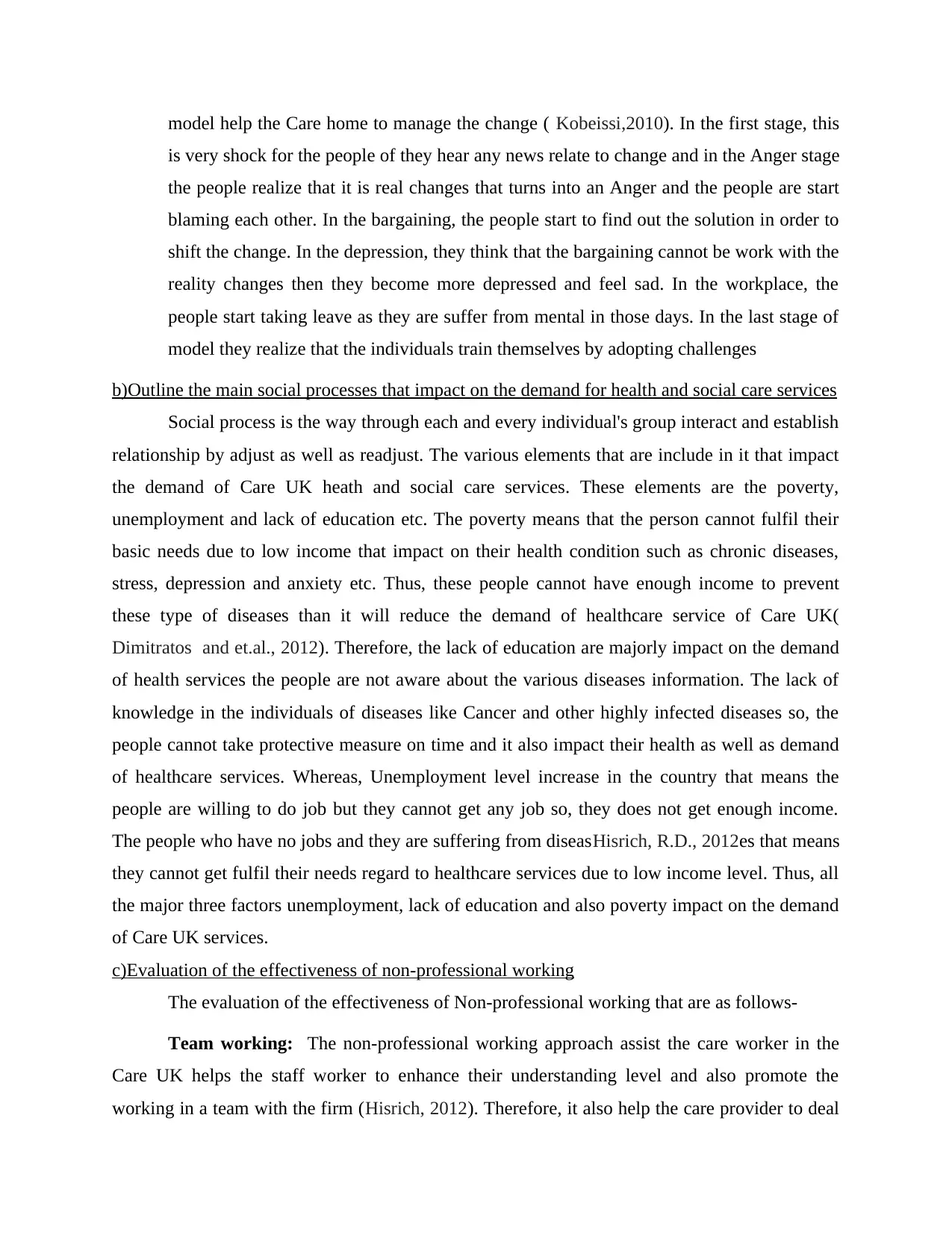
model help the Care home to manage the change ( Kobeissi,2010). In the first stage, this
is very shock for the people of they hear any news relate to change and in the Anger stage
the people realize that it is real changes that turns into an Anger and the people are start
blaming each other. In the bargaining, the people start to find out the solution in order to
shift the change. In the depression, they think that the bargaining cannot be work with the
reality changes then they become more depressed and feel sad. In the workplace, the
people start taking leave as they are suffer from mental in those days. In the last stage of
model they realize that the individuals train themselves by adopting challenges
b)Outline the main social processes that impact on the demand for health and social care services
Social process is the way through each and every individual's group interact and establish
relationship by adjust as well as readjust. The various elements that are include in it that impact
the demand of Care UK heath and social care services. These elements are the poverty,
unemployment and lack of education etc. The poverty means that the person cannot fulfil their
basic needs due to low income that impact on their health condition such as chronic diseases,
stress, depression and anxiety etc. Thus, these people cannot have enough income to prevent
these type of diseases than it will reduce the demand of healthcare service of Care UK(
Dimitratos and et.al., 2012). Therefore, the lack of education are majorly impact on the demand
of health services the people are not aware about the various diseases information. The lack of
knowledge in the individuals of diseases like Cancer and other highly infected diseases so, the
people cannot take protective measure on time and it also impact their health as well as demand
of healthcare services. Whereas, Unemployment level increase in the country that means the
people are willing to do job but they cannot get any job so, they does not get enough income.
The people who have no jobs and they are suffering from diseasHisrich, R.D., 2012es that means
they cannot get fulfil their needs regard to healthcare services due to low income level. Thus, all
the major three factors unemployment, lack of education and also poverty impact on the demand
of Care UK services.
c)Evaluation of the effectiveness of non-professional working
The evaluation of the effectiveness of Non-professional working that are as follows-
Team working: The non-professional working approach assist the care worker in the
Care UK helps the staff worker to enhance their understanding level and also promote the
working in a team with the firm (Hisrich, 2012). Therefore, it also help the care provider to deal
is very shock for the people of they hear any news relate to change and in the Anger stage
the people realize that it is real changes that turns into an Anger and the people are start
blaming each other. In the bargaining, the people start to find out the solution in order to
shift the change. In the depression, they think that the bargaining cannot be work with the
reality changes then they become more depressed and feel sad. In the workplace, the
people start taking leave as they are suffer from mental in those days. In the last stage of
model they realize that the individuals train themselves by adopting challenges
b)Outline the main social processes that impact on the demand for health and social care services
Social process is the way through each and every individual's group interact and establish
relationship by adjust as well as readjust. The various elements that are include in it that impact
the demand of Care UK heath and social care services. These elements are the poverty,
unemployment and lack of education etc. The poverty means that the person cannot fulfil their
basic needs due to low income that impact on their health condition such as chronic diseases,
stress, depression and anxiety etc. Thus, these people cannot have enough income to prevent
these type of diseases than it will reduce the demand of healthcare service of Care UK(
Dimitratos and et.al., 2012). Therefore, the lack of education are majorly impact on the demand
of health services the people are not aware about the various diseases information. The lack of
knowledge in the individuals of diseases like Cancer and other highly infected diseases so, the
people cannot take protective measure on time and it also impact their health as well as demand
of healthcare services. Whereas, Unemployment level increase in the country that means the
people are willing to do job but they cannot get any job so, they does not get enough income.
The people who have no jobs and they are suffering from diseasHisrich, R.D., 2012es that means
they cannot get fulfil their needs regard to healthcare services due to low income level. Thus, all
the major three factors unemployment, lack of education and also poverty impact on the demand
of Care UK services.
c)Evaluation of the effectiveness of non-professional working
The evaluation of the effectiveness of Non-professional working that are as follows-
Team working: The non-professional working approach assist the care worker in the
Care UK helps the staff worker to enhance their understanding level and also promote the
working in a team with the firm (Hisrich, 2012). Therefore, it also help the care provider to deal
Paraphrase This Document
Need a fresh take? Get an instant paraphrase of this document with our AI Paraphraser
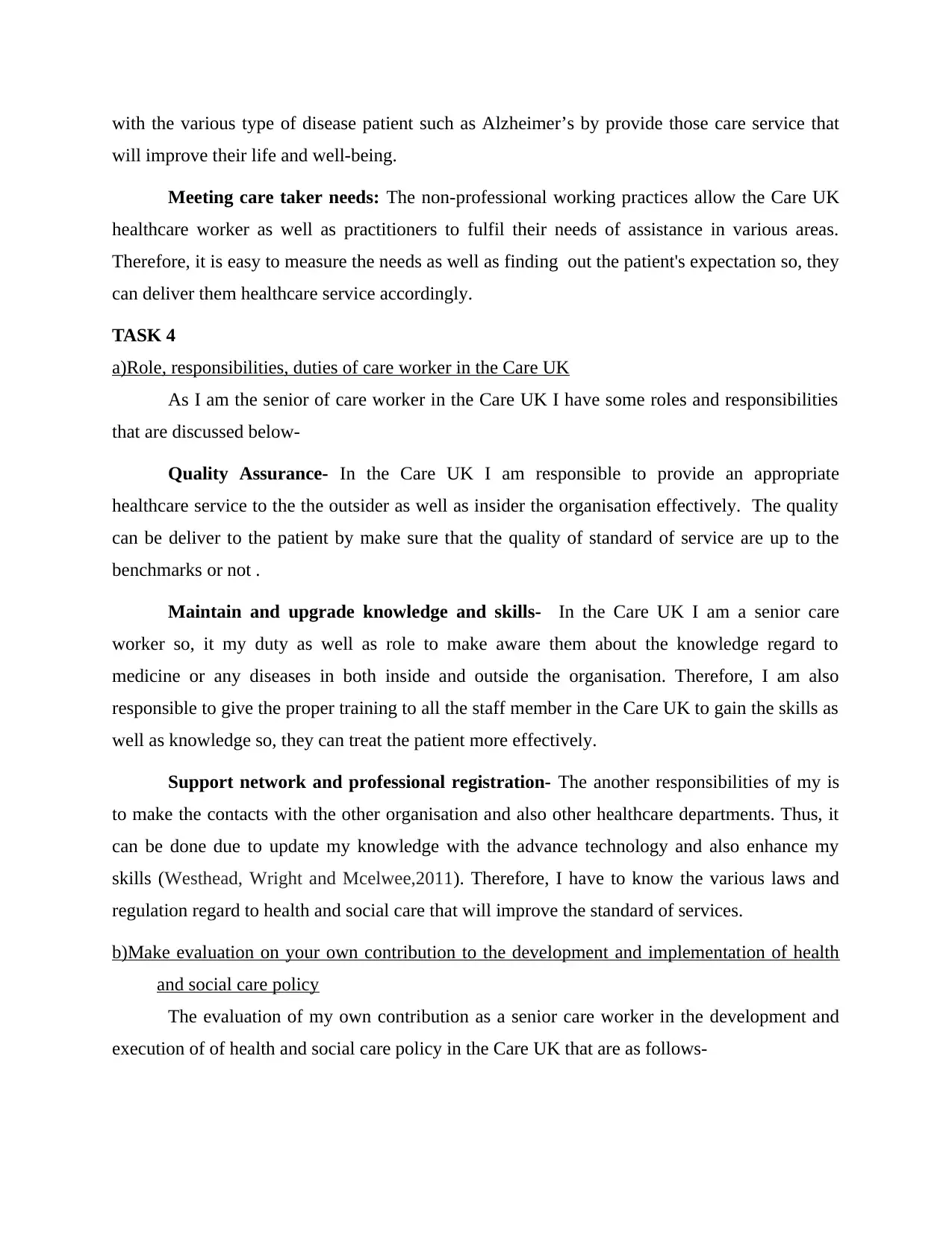
with the various type of disease patient such as Alzheimer’s by provide those care service that
will improve their life and well-being.
Meeting care taker needs: The non-professional working practices allow the Care UK
healthcare worker as well as practitioners to fulfil their needs of assistance in various areas.
Therefore, it is easy to measure the needs as well as finding out the patient's expectation so, they
can deliver them healthcare service accordingly.
TASK 4
a)Role, responsibilities, duties of care worker in the Care UK
As I am the senior of care worker in the Care UK I have some roles and responsibilities
that are discussed below-
Quality Assurance- In the Care UK I am responsible to provide an appropriate
healthcare service to the the outsider as well as insider the organisation effectively. The quality
can be deliver to the patient by make sure that the quality of standard of service are up to the
benchmarks or not .
Maintain and upgrade knowledge and skills- In the Care UK I am a senior care
worker so, it my duty as well as role to make aware them about the knowledge regard to
medicine or any diseases in both inside and outside the organisation. Therefore, I am also
responsible to give the proper training to all the staff member in the Care UK to gain the skills as
well as knowledge so, they can treat the patient more effectively.
Support network and professional registration- The another responsibilities of my is
to make the contacts with the other organisation and also other healthcare departments. Thus, it
can be done due to update my knowledge with the advance technology and also enhance my
skills (Westhead, Wright and Mcelwee,2011). Therefore, I have to know the various laws and
regulation regard to health and social care that will improve the standard of services.
b)Make evaluation on your own contribution to the development and implementation of health
and social care policy
The evaluation of my own contribution as a senior care worker in the development and
execution of of health and social care policy in the Care UK that are as follows-
will improve their life and well-being.
Meeting care taker needs: The non-professional working practices allow the Care UK
healthcare worker as well as practitioners to fulfil their needs of assistance in various areas.
Therefore, it is easy to measure the needs as well as finding out the patient's expectation so, they
can deliver them healthcare service accordingly.
TASK 4
a)Role, responsibilities, duties of care worker in the Care UK
As I am the senior of care worker in the Care UK I have some roles and responsibilities
that are discussed below-
Quality Assurance- In the Care UK I am responsible to provide an appropriate
healthcare service to the the outsider as well as insider the organisation effectively. The quality
can be deliver to the patient by make sure that the quality of standard of service are up to the
benchmarks or not .
Maintain and upgrade knowledge and skills- In the Care UK I am a senior care
worker so, it my duty as well as role to make aware them about the knowledge regard to
medicine or any diseases in both inside and outside the organisation. Therefore, I am also
responsible to give the proper training to all the staff member in the Care UK to gain the skills as
well as knowledge so, they can treat the patient more effectively.
Support network and professional registration- The another responsibilities of my is
to make the contacts with the other organisation and also other healthcare departments. Thus, it
can be done due to update my knowledge with the advance technology and also enhance my
skills (Westhead, Wright and Mcelwee,2011). Therefore, I have to know the various laws and
regulation regard to health and social care that will improve the standard of services.
b)Make evaluation on your own contribution to the development and implementation of health
and social care policy
The evaluation of my own contribution as a senior care worker in the development and
execution of of health and social care policy in the Care UK that are as follows-
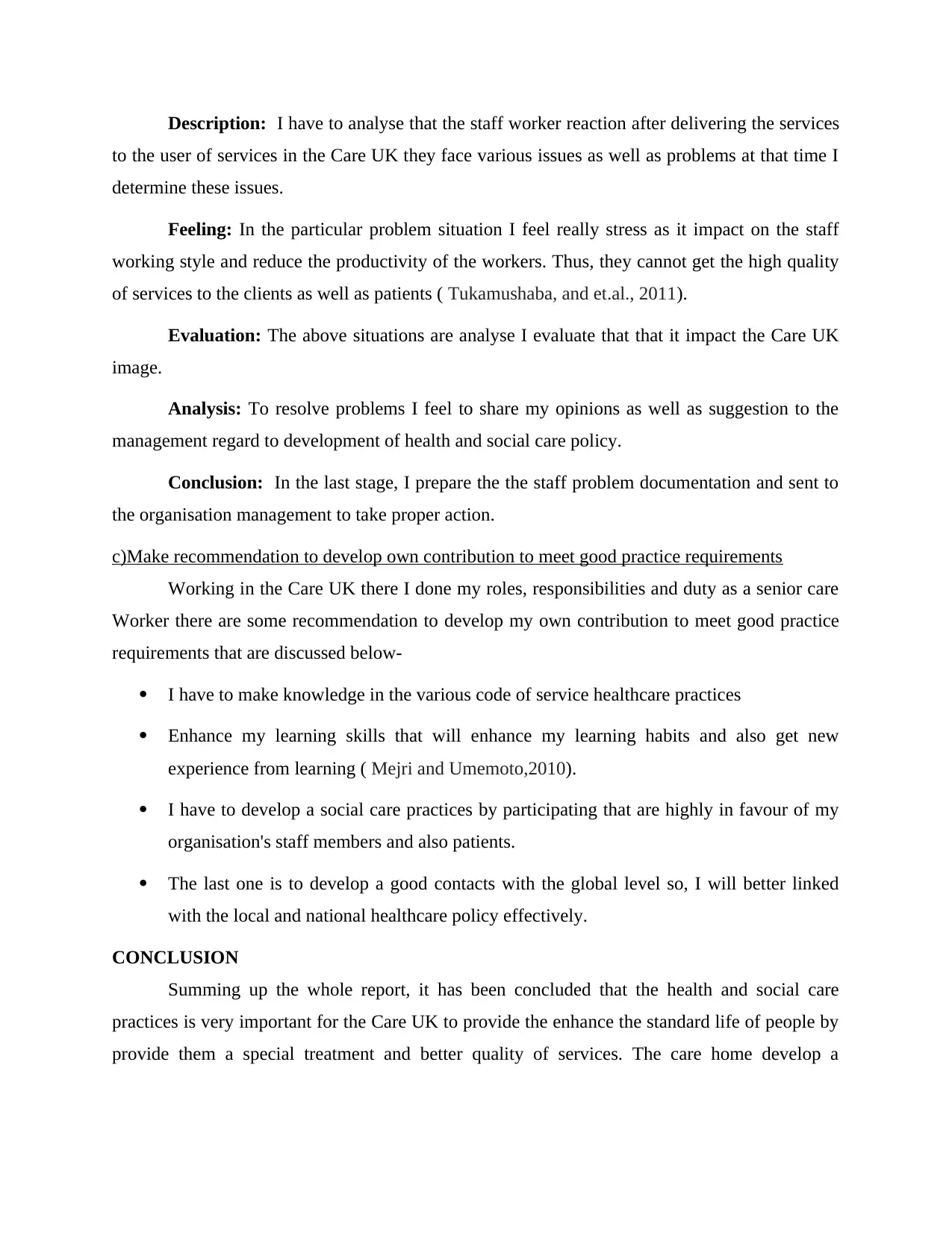
Description: I have to analyse that the staff worker reaction after delivering the services
to the user of services in the Care UK they face various issues as well as problems at that time I
determine these issues.
Feeling: In the particular problem situation I feel really stress as it impact on the staff
working style and reduce the productivity of the workers. Thus, they cannot get the high quality
of services to the clients as well as patients ( Tukamushaba, and et.al., 2011).
Evaluation: The above situations are analyse I evaluate that that it impact the Care UK
image.
Analysis: To resolve problems I feel to share my opinions as well as suggestion to the
management regard to development of health and social care policy.
Conclusion: In the last stage, I prepare the the staff problem documentation and sent to
the organisation management to take proper action.
c)Make recommendation to develop own contribution to meet good practice requirements
Working in the Care UK there I done my roles, responsibilities and duty as a senior care
Worker there are some recommendation to develop my own contribution to meet good practice
requirements that are discussed below-
I have to make knowledge in the various code of service healthcare practices
Enhance my learning skills that will enhance my learning habits and also get new
experience from learning ( Mejri and Umemoto,2010).
I have to develop a social care practices by participating that are highly in favour of my
organisation's staff members and also patients.
The last one is to develop a good contacts with the global level so, I will better linked
with the local and national healthcare policy effectively.
CONCLUSION
Summing up the whole report, it has been concluded that the health and social care
practices is very important for the Care UK to provide the enhance the standard life of people by
provide them a special treatment and better quality of services. The care home develop a
to the user of services in the Care UK they face various issues as well as problems at that time I
determine these issues.
Feeling: In the particular problem situation I feel really stress as it impact on the staff
working style and reduce the productivity of the workers. Thus, they cannot get the high quality
of services to the clients as well as patients ( Tukamushaba, and et.al., 2011).
Evaluation: The above situations are analyse I evaluate that that it impact the Care UK
image.
Analysis: To resolve problems I feel to share my opinions as well as suggestion to the
management regard to development of health and social care policy.
Conclusion: In the last stage, I prepare the the staff problem documentation and sent to
the organisation management to take proper action.
c)Make recommendation to develop own contribution to meet good practice requirements
Working in the Care UK there I done my roles, responsibilities and duty as a senior care
Worker there are some recommendation to develop my own contribution to meet good practice
requirements that are discussed below-
I have to make knowledge in the various code of service healthcare practices
Enhance my learning skills that will enhance my learning habits and also get new
experience from learning ( Mejri and Umemoto,2010).
I have to develop a social care practices by participating that are highly in favour of my
organisation's staff members and also patients.
The last one is to develop a good contacts with the global level so, I will better linked
with the local and national healthcare policy effectively.
CONCLUSION
Summing up the whole report, it has been concluded that the health and social care
practices is very important for the Care UK to provide the enhance the standard life of people by
provide them a special treatment and better quality of services. The care home develop a
⊘ This is a preview!⊘
Do you want full access?
Subscribe today to unlock all pages.

Trusted by 1+ million students worldwide
1 out of 16
Related Documents
Your All-in-One AI-Powered Toolkit for Academic Success.
+13062052269
info@desklib.com
Available 24*7 on WhatsApp / Email
![[object Object]](/_next/static/media/star-bottom.7253800d.svg)
Unlock your academic potential
Copyright © 2020–2026 A2Z Services. All Rights Reserved. Developed and managed by ZUCOL.





